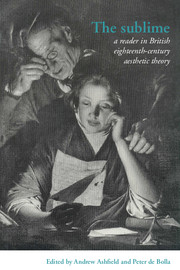Book contents
- Frontmatter
- Contents
- List of Abbreviations
- Introduction
- Part I The Longinian tradition
- Part II Rhapsody to rhetoric
- Part III Irish Perspectives
- 25 A philosophical enquiry into the origin of our ideas of the sublime and beautiful (1759)
- 26 Lectures concerning oratory (1758)
- 27 Clio; or a discourse on taste (1769)
- Part IV The Aberdonian Enlightenment
- Part V Edinburgh and Glasgow
- Part VI From the Picturesque to the Political
- Sources and further reading
27 - Clio; or a discourse on taste (1769)
Published online by Cambridge University Press: 05 June 2012
- Frontmatter
- Contents
- List of Abbreviations
- Introduction
- Part I The Longinian tradition
- Part II Rhapsody to rhetoric
- Part III Irish Perspectives
- 25 A philosophical enquiry into the origin of our ideas of the sublime and beautiful (1759)
- 26 Lectures concerning oratory (1758)
- 27 Clio; or a discourse on taste (1769)
- Part IV The Aberdonian Enlightenment
- Part V Edinburgh and Glasgow
- Part VI From the Picturesque to the Political
- Sources and further reading
Summary
VIII. Thoughts on writing
… The first and noblest source of delight in works of genius, without competition, arises from the sublime. The sublime, by an authority which the soul is utterly unable to resist, takes possession of our attention, and of all our faculties, and absorbs them in astonishment. The passion it inspires us with is evidently a mixture of terror, curiosity, and exultation: but they are stamped with a majesty that bestows on them a different air and character from those passions on any other occasion. In the sublime we feel ourselves alarmed, our motions are suspended, and we remain for some time until the emotion wears off, wrapped in silence and inquisitive horror.
The combination of passions in the sublime, renders the idea of it obscure. No doubt the sensation of fear is very distinct in it; but it is equally obvious, that there is something in the sublime more than this abject passion. In all other terrors the soul loses its dignity, and as it were shrinks below its usual size: but at the presence of the sublime, although it be always awful, the soul of man seems to be raised out of a trance; it assumes an unknown grandeur; it is seized with a new appetite, that in a moment effaces its former little prospects and desires; it is rapt out of the sight and consideration of this diminutive world, into a kind of gigantic creation, where it finds room to dilate itself to a size agreeable to its present nature and grandeur: it overlooks the Appenines, and the clouds upon them, and sees nothing in view around it but immense objects.
- Type
- Chapter
- Information
- The SublimeA Reader in British Eighteenth-Century Aesthetic Theory, pp. 147 - 156Publisher: Cambridge University PressPrint publication year: 1996



